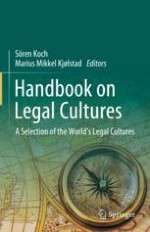2023 | OriginalPaper | Chapter
An Introduction to Colombian Legal Culture
Authors : Catalina Vallejo Piedrahíta, Tania Luna Blanco, Olga Velásquez Ocampo
Published in: Handbook on Legal Cultures
Publisher: Springer International Publishing
Activate our intelligent search to find suitable subject content or patents.
Select sections of text to find matching patents with Artificial Intelligence. powered by
Select sections of text to find additional relevant content using AI-assisted search. powered by
